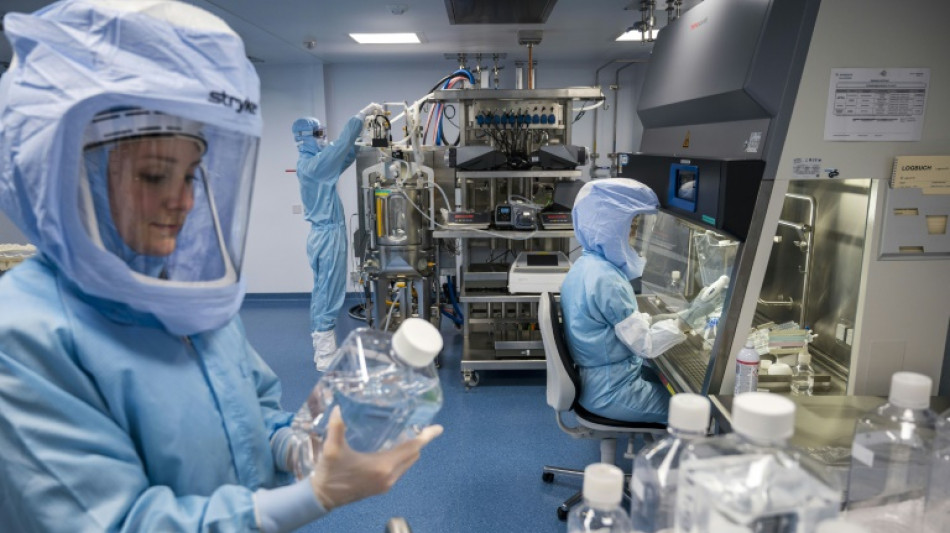
-
 Trump says US to end aid to Colombia over drug production
Trump says US to end aid to Colombia over drug production
-
Power tool-wielding robbers flee Louvre with 'priceless' jewels

-
 Rovanperä win sets up sizzling world rally title battle
Rovanperä win sets up sizzling world rally title battle
-
Israel and Hamas accuse each other of breaching Gaza truce amid strikes, clashes

-
 Japan's world number 500 Kataoka qualifies for Masters, British Open
Japan's world number 500 Kataoka qualifies for Masters, British Open
-
Bangladesh probes cause of massive, costly airport fire

-
 Paz fires high-flying Como to historic win over Juve
Paz fires high-flying Como to historic win over Juve
-
Bolivians head to polls, looking to the right for economic salvation

-
 French pair win ice dance at home figure skating Grand Prix
French pair win ice dance at home figure skating Grand Prix
-
Rybakina storms back from a set down to win Ningbo Open

-
 Red-hot Fleetwood wins in India to continue blistering form
Red-hot Fleetwood wins in India to continue blistering form
-
Captain Marsh guides Australia to victory in rain-hit India ODI

-
 Ex-Satanic priest among seven new saints created by Pope Leo
Ex-Satanic priest among seven new saints created by Pope Leo
-
Power tool-wielding robbers flee Louvre with 'priceless' jewellery

-
 North Korean soldier held by Seoul after crossing land border
North Korean soldier held by Seoul after crossing land border
-
Chainsaw-wielding robbers flee Louvre with jewellery

-
 UK police 'looking into' claims Prince Andrew tried to smear accuser
UK police 'looking into' claims Prince Andrew tried to smear accuser
-
India set Australia 131 to win in rain-hit ODI

-
 Nuns, ex-Satanic priest among seven new saints created by Pope Leo
Nuns, ex-Satanic priest among seven new saints created by Pope Leo
-
Limp Bizkit founding bassist Sam Rivers dies aged 48

-
 Israel identifies dead hostage returned Saturday
Israel identifies dead hostage returned Saturday
-
Canada's Fernandez beats Valentova to win Japan Open

-
 Bangladesh probes cause of massive airport fire
Bangladesh probes cause of massive airport fire
-
Kim Sei-young ends five-year LPGA win drought at BMW Championship

-
 Growing India-Taliban ties anger neighbouring Pakistan
Growing India-Taliban ties anger neighbouring Pakistan
-
Ivory Coast 'returnees' rebuild lives at home

-
 Publishers fight back against US book bans
Publishers fight back against US book bans
-
Border order: Geneva schools kick out Swiss kids living in France

-
 Spain's Fernandez 'cannot believe it' after maiden MotoGP win
Spain's Fernandez 'cannot believe it' after maiden MotoGP win
-
Crisis-hit Bolivia looks to the right for economic salvation

-
 Spain's Raul Fernandez surges to maiden MotoGP win in Australia
Spain's Raul Fernandez surges to maiden MotoGP win in Australia
-
New deal puts Takaichi on track to be Japan's first woman PM: reports

-
 Colombia accuses US of violating sovereignty in strike
Colombia accuses US of violating sovereignty in strike
-
France's ex-president Sarkozy goes to jail

-
 Israel receives bodies of two more hostages returned by Hamas
Israel receives bodies of two more hostages returned by Hamas
-
Pope Leo to proclaim seven new saints, including three nuns

-
 Bollywood's favourite romance still going strong after 30 years
Bollywood's favourite romance still going strong after 30 years
-
Withering vines: California grape farmers abandon fields as local wine struggles

-
 China's power paradox: record renewables, continued coal
China's power paradox: record renewables, continued coal
-
Doncic anchors Lakers' NBA title bid in James's possible last stand

-
 NBA teams ring changes but Thunder still fancied to repeat
NBA teams ring changes but Thunder still fancied to repeat
-
Messi bags hat-trick as Inter roar into playoffs with 5-2 win over Nashville

-
 Pakistan, Afghanistan agree to 'immediate ceasefire' in Qatar talks
Pakistan, Afghanistan agree to 'immediate ceasefire' in Qatar talks
-
Historical Adventure Series ‘Adventures in Time' Inspires Young Readers to Explore the Past

-
 Moderna Highlights Seasonal Flu and H5 Pandemic Flu Candidates at IDWeek 2025
Moderna Highlights Seasonal Flu and H5 Pandemic Flu Candidates at IDWeek 2025
-
Norris retains composure as pressure mounts in title race

-
 Verstappen takes pole to keep pressure on McLaren duo
Verstappen takes pole to keep pressure on McLaren duo
-
Ferrari issue statement backing team boss Vasseur

-
 Barca claim Liga lead, Atletico rise to fourth
Barca claim Liga lead, Atletico rise to fourth
-
Greenwood quadruple sends Marseille top of Ligue 1, Nice down Lyon


From Covid to cancer: High hopes for Nobel mRNA vaccines
The coronavirus pandemic brought global renown to the mRNA technology that underpins vaccines from Pfizer/BioNTech and Moderna, and on Monday earned a Nobel Prize for two scientists who have been key to its development.
Katalin Kariko of Hungary and Drew Weissman of the United States won the Nobel Medicine Prize for their work on "nucleoside base modifications that enabled the development of effective mRNA vaccines against COVID-19".
These types of jabs are new but researchers have been working for decades to try to figure out how to use messenger RNA (ribonucleic acid) for other vaccinations and to treat illnesses from AIDS to cancer.
- How does it work? -
Messenger RNA's job in the body is to help deliver specific instructions from DNA to cells.
In the case of the Pfizer/BioNTech and Moderna jabs, lab-generated mRNA tells human cells to create antigens -- proteins that are similar to ones found in the Covid-19 virus.
Thanks to those antigens, a person's immune system learns how to fight the virus and neutralise Covid if it enters the body.
After the cells create these proteins, the body breaks down the mRNA instructions and gets rid of them.
Such direct communication with cells is revolutionary -- classic vaccines aimed to provoke an immune response by injecting a neutralised form of a virus or antigens into the system.
- Where did this come from? -
The first big breakthrough, in the late 1970s, was in using mRNA to make test-tube cells produce proteins.
A decade later, scientists were able to get the same results in mice, but mRNA still had two major drawbacks as a medical tool.
For one thing, cells in live animals resisted synthetic mRNA, provoking a dangerous immune response.
On top of that, mRNA molecules are fragile, making them difficult to deliver to the system without altering them.
In 2005, Kariko and Weissman of Penn State University published a groundbreaking study showing that a lipid -- or fat molecule -- envelope could safely deliver mRNA without negative effects.
The research caused a buzz in the pharmaceutical community and start-ups dedicated to mRNA therapies began to pop up around the world.
- What else can mRNA do? -
Scientists have worked on developing mRNA jabs for illnesses like seasonal flu, rabies and Zika, as well as those that have remained vaccine-resistant until now, including malaria and AIDS.
Researchers have also started testing personalised treatments on cancer patients, using samples of the proteins in their tumours to create specialised mRNA.
This then triggers the immune system to target specific cancer cells.
"The mRNA platform is versatile," University of Pennsylvania biochemist Norbert Pardi told AFP. "Any protein can be encoded as mRNA so there are many potential applications."
G.Stevens--AMWN



